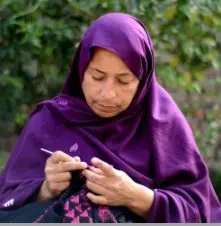Women entrepreneurs and artisans are faced with many problems in Pakistan. Some are related specifically to their gender while other problems are faced by all artisans. Foremost among these are financial issues. Women lack access to credit facilities and are overwhelmed by the complex loaning procedures of financial institutions. Financial management is also a hurdle for them as they lack the requisite training and education. Only around thirteen percent of these women have access to loans compared to eighty seven percent men. Men are almost always likely to obtain bigger loans and this gross inequality in access to finance compromises the empowerment of women. They comprise only five percent of the total gross loan portfolio. Financial organizations like banks, companies and even relatives hesitate to give out loans to women because of the popular discriminatory perception that ‘females can’t handle cash’. As a result, they depend on reserve funds or pursue informal funding. This is especially disheartening as adequate funds are necessary to get a venture off the ground. Additionally, only around two percent of women receive financing for agricultural activities even though a large number of women are involved in it. According to cultural norms, many women don’t get a share in the family property. This lack of assets is a major impediment to empowerment and entrepreneurship.
Traditionally and culturally, women are thought of as responsible for looking after the household. Therefore, their attempts at working are not looked upon favorably. There is a lack of family cooperation and encouragement from society as a whole. Women are predominantly kept away from the decision making process in a family as the patriarchal norms dictate that men take all the important decisions. This affects their confidence when they start business. Role conflict problems arise as women are burdened with the dual work of their business and their household. As a result, there are time constraints and performance is affected.
Women artisans and entrepreneurs have feeble or restricted access to data and contacts. The reason for this is their isolation from the wider society as they are encouraged to stay at home. Their minimal social circles prevent them from gaining knowledge of the market and they lack related field experience. Most often than not, these artisans are not properly educated and trained as compared to their male counterparts. The general trend in Pakistan has been that fewer girls are enrolled in schools annually and more drop out after primary school. This dearth in knowledge, skills, guidance, training and experience causes them to doubt their own selves, which inevitably affects business.
Women often have to deal with poor infrastructure and are hard pressed to solve these problems. Electricity, gas and water shortages hinder the growth and development of business as do poor drainage systems and inadequate roads. Also, the equipment used is typically old fashioned and it is particularly hard for them to acquire better technologies. They face difficulties in obtaining raw material and even accessibility to their workplace and the market is a cause for concern. Women face much more risks in hiring appropriate personnel. Management and marketing also presents problems for them as they are not properly trained.
It is imperative that proper recognition and encouragement be provided to women artisans and entrepreneurs. They should be trained at the field level and briefed about all the stages of entrepreneurship. Special credit policies should be introduced for them and small term loans be given. They should be taught the complex loan lending procedure of banks. Business training should be provided to them free of cost to strengthen their management and communication skills. Also, governments need to allocate more funds for the education of girls.
Women artisans need to be recognized as significant actors in the informal economy, brought under labor laws and protected. No state can achieve sustainable development without the involvement of its women. They comprise an essential part of the social capital of a state.

